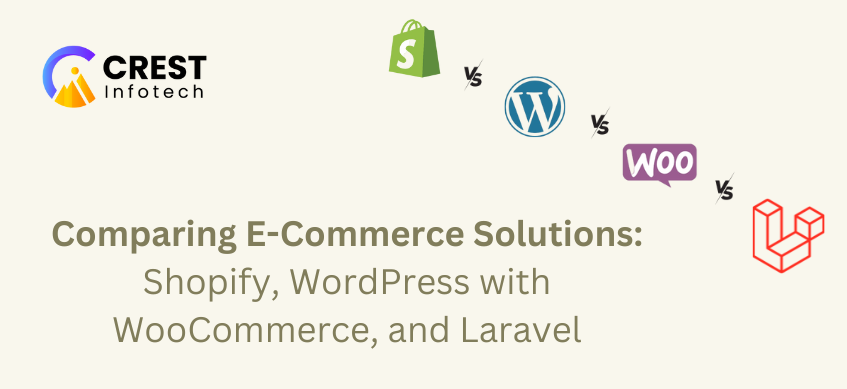E-commerce has revolutionized the way businesses operate, enabling them to reach customers worldwide. With various platforms available for building online stores, choosing the right solution is crucial for your business’s success. This article compares three popular e-commerce solutions: Shopify, WordPress with WooCommerce, and Laravel, highlighting their features, advantages, and drawbacks to help you make an informed decision.
Overview of the Platforms
Shopify
Shopify is a fully hosted e-commerce platform that allows users to create and manage their online stores easily. It offers a range of templates, integrated payment gateways, and various apps to extend functionality. Shopify is known for its user-friendly interface, making it an excellent choice for beginners and small to medium-sized businesses.
WordPress with WooCommerce
WordPress is a powerful content management system (CMS) that, when paired with the WooCommerce plugin, transforms into a robust e-commerce solution. WooCommerce provides all the essential features for online selling, including product management, payment processing, and shipping options. This combination is ideal for those who want more control over their site and the ability to customize their online store.
Laravel
Laravel is a PHP framework designed for building custom web applications, including e-commerce sites. While not a dedicated e-commerce solution, Laravel provides developers with the tools to create tailored applications that meet specific business needs. It offers advanced features like routing, middleware, and an elegant syntax, allowing for high levels of customization and scalability.
Feature Comparison
1. Ease of Use
- Shopify: Extremely user-friendly, with a drag-and-drop interface that requires no coding knowledge. Users can quickly set up their stores, manage products, and process orders.
- WordPress with WooCommerce: While WordPress is relatively easy to use, it requires some familiarity with the CMS. Setting up WooCommerce is straightforward, but customization may require technical skills, especially when dealing with themes and plugins.
- Laravel: Requires a solid understanding of PHP and web development. Laravel is best suited for developers who want to build a custom e-commerce solution from the ground up, making it less accessible for non-technical users.
2. Customization
- Shopify: Offers a range of customizable templates and apps. However, customization options are somewhat limited compared to WordPress and Laravel, especially for advanced features.
- WordPress with WooCommerce: Highly customizable, thanks to the vast library of plugins and themes available. Users can modify their store extensively, from layout to functionality, to suit their needs.
- Laravel: Provides complete control over the application’s architecture and design. Developers can create custom functionalities, integrate third-party APIs, and tailor the user experience without restrictions.
3. Scalability
- Shopify: Scales well with growing businesses. Plans are available to accommodate larger volumes of sales and traffic, and Shopify handles hosting and performance optimization.
- WordPress with WooCommerce: Scalability can be a concern as traffic increases, depending on the hosting provider and server resources. However, with proper hosting and optimization, WooCommerce can effectively manage large stores.
- Laravel: Offers excellent scalability options, making it suitable for large and complex e-commerce applications. Developers can optimize performance and implement caching strategies for better handling of increased traffic.
4. Cost
- Shopify: Charges a monthly subscription fee that varies based on the plan selected. Additional costs may include transaction fees, premium themes, and apps.
- WordPress with WooCommerce: While the WordPress software itself is free, costs can accumulate through hosting, premium themes, and plugins. Users have the flexibility to choose budget-friendly options or invest in high-quality solutions.
- Laravel: As a framework, Laravel is open-source and free to use. However, costs arise from development time, hosting, and potential maintenance, making it suitable for businesses willing to invest in custom solutions.
5. Payment Gateways
- Shopify: Supports multiple payment gateways, including Shopify Payments, PayPal, and Stripe. Integration is seamless, and users can easily manage transactions.
- WordPress with WooCommerce: Offers a variety of payment gateway options, including PayPal, Stripe, and others through plugins. Users have the flexibility to choose the gateways that best suit their business needs.
- Laravel: Payment gateway integration is manual, requiring developers to implement APIs for services like Stripe, PayPal, or Square. This allows for greater customization but demands more development time.
Security
- Shopify: Provides a secure environment with built-in SSL certificates, ensuring data protection. Shopify is PCI compliant, making it a reliable choice for processing payments.
- WordPress with WooCommerce: Security largely depends on the hosting provider and the plugins used. Users must implement security measures, such as SSL certificates and security plugins, to protect their sites.
- Laravel: Offers robust security features, including built-in protection against SQL injection, cross-site request forgery (CSRF), and cross-site scripting (XSS). However, developers must be proactive in maintaining security standards.
Conclusion
When choosing an e-commerce solution, the right choice depends on your specific needs, budget, and technical capabilities.
- Shopify is ideal for those seeking a user-friendly, all-in-one solution with minimal technical requirements. It’s great for small to medium-sized businesses that want to get up and running quickly.
- WordPress with WooCommerce is best suited for users who desire more control over their online store and are comfortable navigating the WordPress ecosystem. It’s perfect for businesses looking for extensive customization options and flexibility.
- Laravel is the optimal choice for businesses with specific requirements that demand a custom-built application. It’s suited for developers and companies willing to invest in a tailored solution that can grow alongside their business.
Ultimately, the best e-commerce solution for your project will depend on your unique goals, resources, and preferences. Evaluate each option carefully to ensure it aligns with your business strategy and vision.
